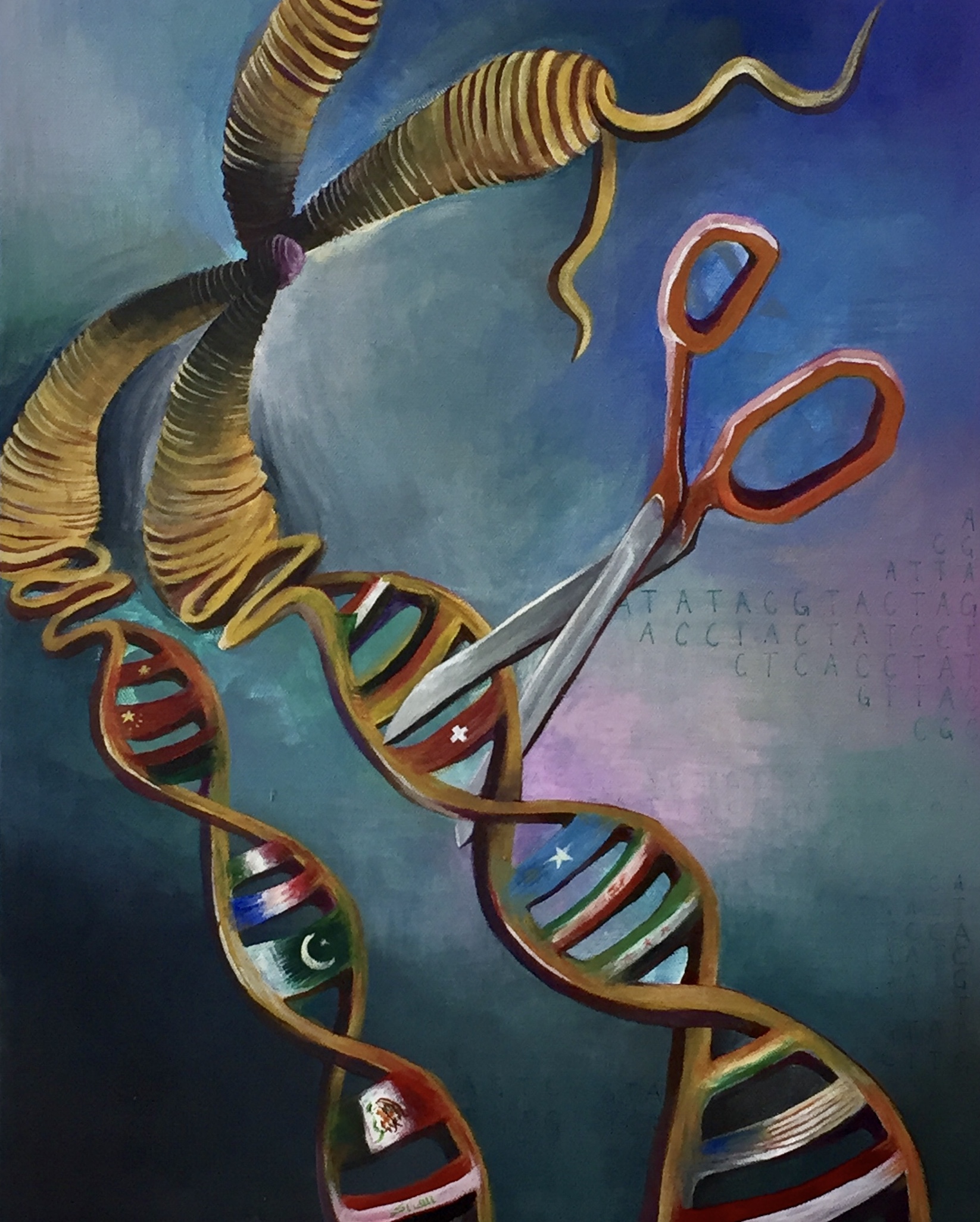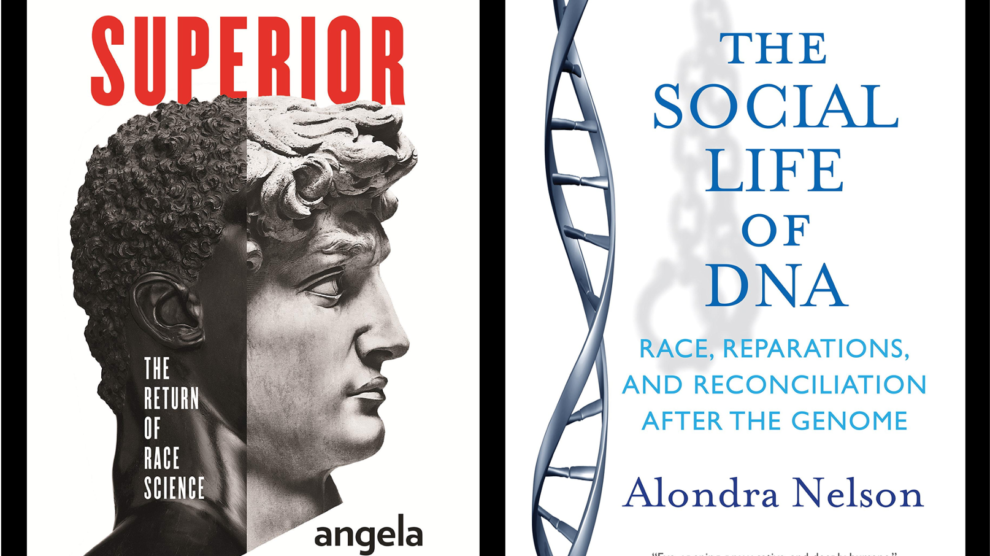Still Not in Our Genes: Resisting the Narrative Around GWAS
By Kevin Bird
Volume 23, number 3, Bio-Politics
After years of struggling to uncover the genetic basis of complex diseases, genome-wide association studies (GWAS) were heralded as a revolution in human genetics. GWAS look for genetic differences in a population to correlate with disease. Aided by large sample sizes — often in the tens of thousands — and breakthroughs in genome sequencing technology, GWAS revealed some of the first genetic associations to complex diseases like acute macular degeneration and inflammatory bowel disease.1 Later innovations improved researchers’ understanding of other diseases and provided insight for therapeutic research.2
The success of GWAS in biomedicine gave many behavioral geneticists hope after years of disappointing results. Behavioral geneticists attempted the controversial goal of rooting complex social and behavioral traits like intelligence, educational attainment, or even income to genetic differences between individuals. In pursuit of these goals, GWAS eventually identified hundreds of genetic variants associated with behavioral traits.3 Researchers then combined the estimated effect of all the associated variants to yield a “polygenic score” for their study that predicts intelligence, income, or educational attainment of individuals based on their DNA.4
GWAS and polygenic scores have been heralded as a triumph for those seeking genetic causes of human behavior and have led to a resurgence of reductionist and biological determinist views of humans and society. Behavioral geneticist Robert Plomin, in many presentations and his 2018 book, Blueprint: How DNA Makes Us Who We Are, portrays polygenic scores as “100% reliable, unbiased, and causal” and says “DNA isn’t all that matters but it matters more than everything else put together.”5 The role of the environment is discarded because it is deemed unsystematic and random.
However, the novelty of genomic methods gives only an illusion of progress. In reality, polygenic scores account for only a minuscule amount of variation in behavioral traits. For example, polygenic risk scores for educational attainment explain around 11 percent of variance, for intelligence around 8 percent, and for income around 2 percent.6 Perhaps more importantly, these scores have not identified specific genetic etiologies; they do not provide coherent biological pathways or mechanisms by which these traits arise. In fact, the fundamentally correlative nature of these methods means we often cannot separate genetic causation from the confounding effects of gene-environment interplay. Polygenic scores over-predict genetic contribution because they do not control for a multitude of environmental effects stemming from parental behavior, socioeconomic status, and other sources.7 As a result, studies can suggest spurious associations between genes and measured outcome.8 The assertion by Plomin and others that GWAS provide simple, clear genetic causation is therefore inaccurate.
New genetic reductionists like Plomin, Steven Pinker,9 or Charles Murray10 assert that polygenic scores demonstrate why some individuals are smarter, better educated, or wealthier. The supposed objectivity of fundamentally correlative research legitimizes their claim in the eyes of the public, and dismisses criticisms as politically and ideologically motivated. However, as radical scientists we know there is no neutral science; the questions we ask, the funding we receive, the data we collect, and our interpretations of results are parts of our sociopolitical environments.11 Research that draws a reductive causal line from genetics to the structure of society often seeks to maintain existing oppressive structures by restricting attempts to radically address inequality through social change. For example, Plomin argues that instead of addressing structural disparities in education, we should use genetic profiles to generate personalized pedagogies.12 Toby Young, Plomin’s co-author and a former board member of the UK Office for Students, uses behavioral genetics research to support “progressive” eugenics, which would screen out embryos with low predicted IQ.13 This is touted as the only solution to fix the perceived innate deficiencies of the poor and less intelligent, demonstrating that some would sooner change people’s biology than address inequality inherent to our system. Whether conscious or unconscious, the biological determinist framing of this work is leveraged to preserve class oppression.
With polygenic scores we see the same bluster and bravado that biological determinists exhibited with older methods like twin studies.14,15 Failure to learn from past episodes has led to the resurgence of genetic reductionism. However, we can still turn to our radical forebears, like the founders of Science for the People, to break the cycle by embracing dialectical biology.16 Dialectical biology rejects a reductionist chain of causation from gene to society and emphasizes the ways our social environment impacts our biological development — and vice versa. Neither is immutable and their relationship is constantly changing. A GWAS polygenic score might suggest that a genetic variant is to blame for differences in educational attainment. In contrast, a dialectical biologist recognizes that individuals exist within a particular educational system with policies and funding determined by our political and social structures. They know that income, a strong non-genetic predictor of educational attainment,17 is affected by unionization, minimum wage laws, universal basic income, and other aspects of how society values labor. To detach social outcomes from the context in which they are embedded hinders our ability to understand the causes of these phenomena.
More dangerously, when socioeconomic differences are attributed to genetics and claimed to be intransigent to environmental intervention, the same reasoning could be applied to differences in outcome between racial groups. In one paper, an author uses publicly available genomic data to construct polygenic scores for individuals around the world and correlates them with average IQ scores of their home country, associating genetic variants among Africans to explain their lower IQ scores.18,19 Another paper correlates European ancestry to IQ scores in a sample of Black Americans.20,21 Others use results from mainstream research to speculate on evolutionary explanations for racial disparities or defend such speculative work on the basis of free inquiry.22,23,24,25,26,27,28 In each case, the researchers improperly treat IQ scores as a measure of innate cognitive capacity and fail to reckon with the racist histories of IQ studies;29 in fact, they often embrace that history by using biased datasets.30
The researchers producing these works are largely connected to the Pioneer Fund, the decades old white supremacist organization infamously involved in political opposition to school integration and civil rights policy.31 Their research is frequently published in pseudo-journals associated with the Pioneer Fund like the OpenPsych journals or Mankind Quarterly, which are marred by questionable publishing and peer-review practices.32 Nevertheless, their papers sometimes sneak into legitimate journals via inexperienced reviewers and editorial boards connected or sympathetic to Pioneer Fund networks. For example, Richard Haier, editor-in-chief of the journal Intelligence,33 has defended scientific racism;34 the journal has hosted many Pioneer Fund scientists and regularly prints misapplications of genetic research, to the chagrin of other behavioral geneticists.35 Likewise, Bryan Pesta, a collaborator with Pioneer Fund authors, handled a special issue for the new MDPI journal Psych devoted to race, IQ, and genetics which consisted almost entirely of Pioneer Fund authors.36 These papers are distributed on social media and neo-Nazi websites to fuel an online ecosystem of racism that recruits and indoctrinates people to far right ideologies.37,38 Public intellectuals like Charles Murray further launder these authors and their research articles by promoting them on social media,39,40 lending credence to these works among the general public.
Part of the reason this research is popular with uninformed or misguided people on the internet is that mainstream research primes them to think of genetics as driving major social differences. While geneticists have recently attempted to address misinterpretations of their work, such as the American Society of Human Genetics’s statement denouncing scientific racism,41 these efforts rarely interrogate how biological determinism influences our interpretations and assumptions. Concrete steps to integrate dialectical perspectives may include deeper collaborations between geneticists and fields like anthropology, history, and sociology. By doing so, we can mitigate biological determinism and begin more accurate investigations into the effect that societal hierarchies have on our biology. Importantly, we can also reflect on the personal limits of our knowledge in terms of race, class, and gender. Worksheets from organizations like Free Radicals42 can help investigators identify ways their social position influences hypotheses, questions, and research goals and change the way they practice science. Furthermore, involving groups like Free Radicals helps center marginalized voices in scientific discussions.
As geneticists at the cutting edge of GWAS, we must pay special attention to training reviewers from other fields in how to interpret polygenic scores. Informed reviewers can prevent faulty research from being published in fields like psychology and economics which have quickly embraced these metrics as definitive proof of genetic cause. Finally, educators and science communicators should perform outreach to aid in the development of school curricula. This will help inoculate against biological determinism and scientific racism. Pilot work suggests that altering curriculum can reduce prejudice and better equip students to engage with the intersection of genetics and society.43 Any outreach resources should also be freely available and understandable to a varied lay audience. Critically, efforts like these should be supported by funding agencies like the National Science Foundation and professional societies to ensure they are provided the resources they need to carry out this important work.
If we want to break the cycle of periodic revivals of scientific racism, we need a science that is robust to the fallacies and misgivings of biological determinism and genetic reductionism. Embracing dialectical biology means we recognize that race is a function of racism, that our material conditions exert influence over our biological development, and that science is always embedded with a broader social context. Without these fundamental shifts in the way we practice science and interpret our results, our work on this issue will only buy us time until breakthroughs in biology are co-opted once again in the service of scientific racism.
Notes
- James R. M. Black and Simon J. Clark, “Age-Related Macular Degeneration: Genome-Wide Association Studies to Translation,” Genetics in Medicine 18, no. 4 (2015): 283–289, https://doi.org/10.1038/gim.2015.70; Jimmy Z. Liu et al., “Association Analyses Identify 38 Susceptibility Loci for Inflammatory Bowel Disease and Highlight Shared Genetic Risk across Populations,” Nature Genetics 47, no. 9 (2015): 979–986, https://doi.org/10.1038/ng.3359.
- Melina Claussnitzer et al., “A Brief History of Human Disease Genetics,” Nature 577, no. 7789 (2020): 179–189, https://doi.org/10.1038/s41586-019-1879-7.
- Andrea Ganna et al., “Large-Scale GWAS Reveals Insights into the Genetic Architecture of Same-Sex Sexual Behavior,” Science 365, no. 6456 (2019), https://doi.org/10.1126/science.aat7693; James J. Lee et al., “Gene Discovery and Polygenic Prediction from a Genome-Wide Association Study of Educational Attainment in 1.1 Million Individuals,” Nature Genetics 50, no. 8 (2018): 1112–1121, https://doi.org/10.1038/s41588-018-0147-3.
- “Polygenic Risk Scores,” Genome.gov (National Human Genome Research Institute), accessed November 5, 2020, https://www.genome.gov/Health/Genomics-and-Medicine/Polygenic-risk-scores.
- Richard Barnard, October 12, 2017, https://web.archive.org/web/20201028135512/https://twitter.com/RBarnardIoP/status/918424021993250816?s=20; Robert Plomin, “In the Nature–Nurture War, Nature Wins,” Scientific American Blog Network, December 14, 2018, https://blogs.scientificamerican.com/observations/in-the-nature-nurture-war-nature-wins/.
- James J. Lee et al., “Gene Discovery and Polygenic Prediction;” W. David Hill et al., “Genome-Wide Analysis Identifies Molecular Systems and 149 Genetic Loci Associated with Income,” Nature Communications 10, no. 1 (2019), https://doi.org/10.1038/s41467-019-13585-5.
- Augustine Kong et al., “The Nature of Nurture: Effects of Parental Genotypes,” Science 359, no. 6374 (2018): 424–428, https://doi.org/10.1126/science.aan6877; Rosa Cheesman et al., “Comparison of Adopted and Nonadopted Individuals Reveals Gene–Environment Interplay for Education in the UK Biobank,” Psychological Science 31, no. 5 (2020): 582–591, https://doi.org/10.1177/0956797620904450; Hakhamanesh Mostafavi et al., “Variable Prediction Accuracy of Polygenic Scores within an Ancestry Group,” eLife 9 (2020), https://doi.org/10.7554/elife.48376.
- Arslan A. Zaidi and Iain Mathieson, “Demographic History Impacts Stratification in Polygenic Scores,” bioRxiv, 2020, https://doi.org/10.1101/2020.07.20.212530; Tim T. Morris et al., “Population Phenomena Inflate Genetic Associations of Complex Social Traits,” Science Advances 6, no. 16 (2020), https://doi.org/10.1126/sciadv.aay0328.
- Steven Pinker, “My Genome, My Self,” The New York Times, January 7, 2009, https://www.nytimes.com/2009/01/11/magazine/11Genome-t.html.
- Charles Murray, “Genetics Will Revolutionize Social Science,” The Wall Street Journal, January 27, 2020, https://www.wsj.com/articles/genetics-will-revolutionize-social-science-11580169106
- Frank Rosenthal, “The COVID-19 Pandemic and the Dual Nature of Science,” Science for the People Magazine, August 26, 2020, https://magazine.scienceforthepeople.org/web-extras/covid-19-coronavirus-pandemic-science-politics/.
- Robert Plomin, “‘If I Were Education Secretary…,’” Schools Week, July 28, 2017, https://schoolsweek.co.uk/if-i-were-education-secretary-3/.
- Toby Young, “The Fall of the Meritocracy,” Quadrant Online, September 7, 2015, https://quadrant.org.au/magazine/2015/09/fall-meritocracy/
- David S. Moore and David Shenk, “The Heritability Fallacy,” Wiley Interdisciplinary Reviews: Cognitive Science 8, no. 1–2 (2016), https://doi.org/10.1002/wcs.1400.
- Richard C. Lewontin, “The Analysis of Variance and the Analysis of Causes,” International Journal of Epidemiology 35, no. 3 (2006): 520–525, https://doi.org/10.1093/ije/dyl062.
- Richard Levins and Richard C. Lewontin, The Dialectical Biologist (Cambridge, MA: Harvard University Press, 1987), 3–5.
- Eleni Karagiannaki, “The Effect of Parental Wealth on Children’s Outcomes in Early Adulthood,” The Journal of Economic Inequality 15, no. 3 (2017): 217–243, https://doi.org/10.1007/s10888-017-9350-1.
- Davide Piffer, “Evidence for Recent Polygenic Selection on Educational Attainment and Intelligence Inferred from Gwas Hits: A Replication of Previous Findings Using Recent Data,” Psych 1, no. 1 (2019): 55–75, https://doi.org/10.3390/psych1010005.
- Kevin Andrew Bird, “No Support for the Genetic Hypothesis of the Black-White Achievement Gap Using Polygenic Scores and Tests for Divergent Selection,” SocArxiv, 2020, https://doi.org/10.31235/osf.io/2qfkt.
- Jordan Lasker et al., “Global Ancestry and Cognitive Ability,” Psych 1, no. 1 (2019): 431–459, https://doi.org/10.3390/psych1010034.
- Bird, “No Support.”
- Nathan Cofnas, “Research on Group Differences in Intelligence: A Defense of Free Inquiry,” Philosophical Psychology 33, no. 1 (2019): 125–147, https://doi.org/10.1080/09515089.2019.1697803.
- Bo Winegard, Ben Winegard, and Jonathan Anomaly, “Dodging Darwin: Race, Evolution, and the Hereditarian Hypothesis,” Personality and Individual Differences 160 (2020): 109915, https://doi.org/10.1016/j.paid.2020.109915.
- Noah Carl, “The Fallacy of Equating the Hereditarian Hypothesis with Racism,” Psych 1, no. 1 (January 2019): 262–278, https://doi.org/10.3390/psych1010018.
- Gerhard Meisenberg, “Should Cognitive Differences Research Be Forbidden?,” Psych 1, no. 1 (January 2019): 306–319, https://doi.org/10.3390/psych1010021.
- Noah Carl, “How Stifling Debate Around Race, Genes and IQ Can Do Harm,” Evolutionary Psychological Science 4, no. 4 (2018): 399–407, https://doi.org/10.1007/s40806-018-0152-x.
- Rasmus Rosenberg Larsen et al., “More than Provocative, Less than Scientific: A Commentary on the Editorial Decision to Publish Cofnas (2020),” Philosophical Psychology 33, no. 7 (2020): 893–898, https://doi.org/10.1080/09515089.2020.1805199.
- John P. Jackson and Andrew S. Winston, “The Mythical Taboo on Race and Intelligence,” Review of General Psychology, July 2020, https://doi.org/10.1177/1089268020953622.
- Joseph L. Graves and Amanda Johnson, “The Pseudoscience of Psychometry and The Bell Curve,” The Journal of Negro Education 64, no. 3 (1995): 277, https://doi.org/10.2307/2967209.
- EHBEA Committee, “EHBEA Statement on National IQ Datasets,” European Human Behavior and Evolution Association, July 2020, https://web.archive.org/web/20201103075522/https://ehbea2020.com/wp-content/uploads/2020/07/EHBEA_IQ_statement.pdf.
- “Pioneer Fund,” Southern Poverty Law Center, accessed November 5, 2020, https://web.archive.org/web/20201106012812/https://www.splcenter.org/fighting-hate/extremist-files/group/pioneer-fund.
- Ben van der Merwe, “No, Objecting to Cambridge’s Appointment of a Eugenicist Is Not about Free Speech,” New Statesman, December 20, 2018, https://www.newstatesman.com/politics/education/2018/12/no-objecting-cambridge-s-appointment-eugenicist-not-about-free-speech.
- “Intelligence Editorial Board,” Intelligence Editorial Board, accessed November 5, 2020, https://web.archive.org/web/20201020035427/https://www.journals.elsevier.com/intelligence/editorial-board.
- Richard Haier, “No Voice at VOX: Sense and Nonsense about Discussing IQ and Race,” Quillette, August 22, 2018, https://quillette.com/2017/06/11/no-voice-vox-sense-nonsense-discussing-iq-race/.
- Eric Turkheimer, July 20, 2020, https://web.archive.org/web/20200721014213/https://twitter.com/ent3c/status/1285357360031170561.
- “Special Issue: ‘Beyond Thirty Years of Research on Race Differences in Cognitive Ability,’” 2019, https://web.archive.org/web/20201003032519/https://www.mdpi.com/journal/psych/special_issues/race_differences_cognitive_ability.
- Amy Harmon, “Why White Supremacists Are Chugging Milk (and Why Geneticists Are Alarmed),” New York Times, October 17, 2018, https://www.nytimes.com/2018/10/17/us/white-supremacists-science-dna.html.
- Aaron Panofsky, Kushan Dasgupta, and Nicole Iturriaga, “How White Nationalists Mobilize Genetics: From Genetic Ancestry and Human Biodiversity to Counterscience and Metapolitics,” American Journal of Physical Anthropology, 2020, https://doi.org/10.1002/ajpa.24150.
- Charles Murray, September 4, 2019, https://web.archive.org/web/20200228001806if_/https://twitter.com/charlesmurray/status/1233045643096133633.
- Charles Murray, March 8, 2020, https://web.archive.org/web/20201105184839/https://twitter.com/charlesmurray/status/1236716042849849344?s=20
- ASHG Denounces Attempts to Link Genetics and Racial Supremacy,” The American Journal of Human Genetics 103, no. 5 (2018): 636, https://doi.org/10.1016/j.ajhg.2018.10.011.
- “Research Justice Worksheet,” Free Radicals, November 5, 2020, https://web.archive.org/web/20201105114314/https://freerads.org/wp-content/uploads/2020/06/research-justice-worksheet-with-refs.pdf.
- Brian M. Donovan et al., “Toward a More Humane Genetics Education: Learning about the Social and Quantitative Complexities of Human Genetic Variation Research Could Reduce Racial Bias in Adolescent and Adult Populations,” Science Education 103, no. 3 (2019): 529–560, https://doi.org/10.1002/sce.21506.






